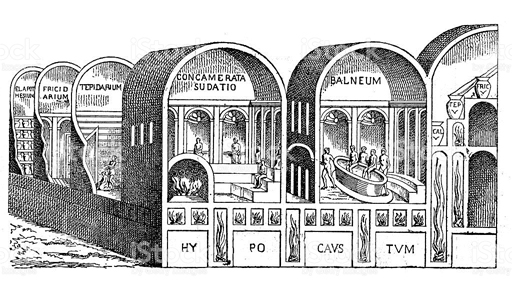2.3 Baths in literature
Here is Seneca the Younger writing about the public baths. It’s a very sensory account based on the sounds he can hear:
May I perish if silence is as necessary as it seems for a man who has withdrawn to study. Listen, on all sides noises of every sort resound about me. I am living right above a public bath. Imagine now every sort of voice which can sicken the ears. When strong men train and lift dumb-bells, when they are in pain or pretend they are, I hear groans; whenever they let out their breath I hear whistling and laboured gasping. When I chance upon some lazy fellow who is happy with a cheap rub-down, I hear the slap of a hand laid on his shoulders, which makes different sounds depending on whether it is flat or hollow. If the scorer turns up and begins to count the balls, I am done for. Add now the man kicking up a row and the thief who is caught and the man who thinks he sounds good singing in the bath, add those who jump into the pool with an enormous splash. Besides those whose voices are, if nothing else, at least natural, think of the hair-plucker repeatedly calling out in his thin and high-pitched voice to attract customers, who never shuts up except when he is pulling hairs out of armpits and makes someone else shout out instead of him. Think of the different shouts of the drinks-seller and the sausage-seller and the pastry-seller and all the cook-shop hawkers selling their wares, each with his own personal cry.
Once again, though, what sounds like a very realistic and vivid description is not as straightforward as it first appears. Seneca’s point is that he is able to rise above all this disturbance because of his approach to life, based on Stoic philosophy. He claims: ‘I no more notice all this roar of noise than I do the sound of waves or falling water’. Life, he says, is like a bath – things happen which you can’t predict, but so long as you can ignore them and stay calm you will be fine.
Somewhat undercutting all this optimism, however, at the very end of this letter he announces that he can’t stand it any longer and will be moving house!
The various activities at a bath make it more like going to the gym today. It is also clearly a social occasion rather than primarily being about cleanliness. Indeed, some of the activities mentioned by Seneca could have spread disease as the water was not disinfected or changed. External parasites, including fleas and lice, were common in the ancient world; delousing combs have been found. While lice are unlikely to be spread in water – as they stick to their host – some of the other activities at a Roman bath involved the sort of close body contact which spread disease: for example, in the exercise areas, and as a result of the work of the masseurs and barbers who were at the baths. At Caerleon, teeth have been found with the marks of extraction instruments on them, suggesting that dental extraction went on alongside Seneca’s hair-pluckers and food vendors.
Worryingly, some medical advice involved recommending the baths for those with weeping skin conditions. For example:
Moreover, the patient who is robust, if the pustules are small, ought to go to the bath and sweat, and at the same time to dust the pustules with soda and to mix wine with oil and anoint himself, after which he goes down into the hot bath.

